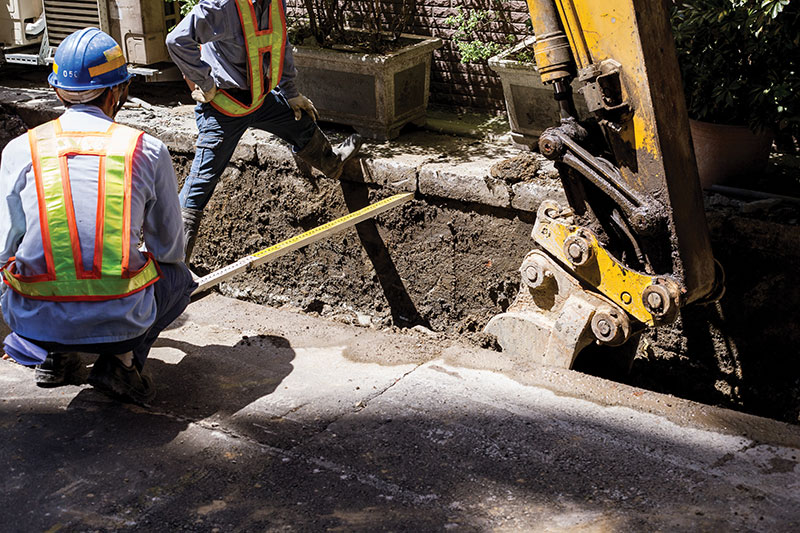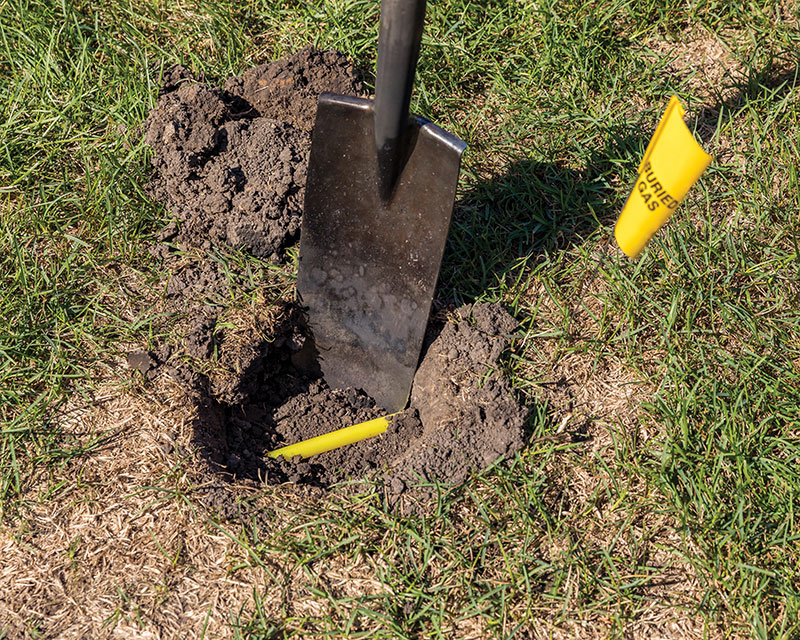December 2020, Vol. 247, No. 12
Features
APGA Focuses on Industry Safety, Advocacy
Since it was formed in 1961, the American Public Gas Association (AGPA) has played an instrumental role in the operations of more than 700 member companies in 36 states.
The nonprofit trade group has a number of vital functions that serve the interests of the industry and ultimately the consumers who are buying that natural gas in increasing amounts and will continue to do so far into the future.

APGA represents its members before Congress and other federal agencies by carefully assembling regulatory and legislative positions. The Washington, D.C.-based association also holds meetings, seminars and workshops throughout the year designed to help member companies improve their reliability, operational efficiency and regulatory environment.
John Leary, chairman of APGA, was elected July 23 to a one-year term during the virtual 2020 APGA special meeting, held in lieu of the organization’s annual meeting.
In this interview, Leary discusses APGA’s priorities for the coming year, helping members who are coping with the coronavirus and engaging the public concerning natural gas and other topics.
P&GJ: What led you to a career in natural gas?
John Leary: After spending the first 12 years of my career as an engineer and manager in various industrial operations, I took the position of assistant superintendent for the Chambersburg Gas Department.
About a month later, the department head position opened up, and I’ve been blessed to manage the Gas and Stores (Borough Warehouse and Emergency Dispatch) departments ever since.
I truly consider it an honor to have worked for Chambersburg in the gas industry for the past 20 years. I love the fact that we provide a product that helps those in poverty, benefits the environment, is safe and provides comfort and convenience to our customers. It feels good to go home every night knowing you are providing a product that is really helping the community.
P&GJ: Tell us about the Borough of Chambersburg.
Leary: The Borough of Chambersburg is located in South Central Pennsylvania, with a population of about 21,000. We are unique in that we are the only municipality in Pa. to provide electric (including generation), gas, water, sewer, trash and storm sewer utilities. Chambersburg is proud to offer the lowest composite utility rates available in Pa., including specifically the lowest gas rates.
Our gas system began as a privately owned company in 1856, manufacturing synthetic gas from coal for street lighting. Chambersburg’s only system interruption occurred in 1863 when the town was burned by Confederate soldiers. In 1946, the Borough purchased the gas company, and shortly thereafter converted the system to natural gas provided by the Texas Eastern pipeline.
P&GJ: What are your top priorities for the coming year?
Leary: Given our desire for continuous improvement of our safety track record, I’m proud that APGA is actively helping members implement Pipeline Safety Management Systems (PSMS). Additionally, APGA provides significant assistance to members with operator qualification, distribution integrity management programs and drug and alcohol programs.I
I also believe it is critical that we improve our communication with the public on the positives of natural gas. Given the incredible benefits from using natural gas, I am always amazed there are special interest groups working to eliminate it as an energy choice for Americans. In my opinion, much of the reason so many people lack knowledge about the benefits of gas is because we don’t do enough to educate them.
We in the industry know that natural gas is good for the pocketbooks of those who are less fortunate, and that it is the best way to help the environment. But it is easy to forget that not everyone in the country has this knowledge. That is why we must educate. Toward that end, my theme for APGA this year is “Using Our Voice.” We need to provide America with the facts about natural gas.
P&GJ: What are some of the challenges to natural gas that you are focused on?
Leary: While APGA members have not stopped working amid the COVID-19 pandemic, it doesn’t mean they haven’t faced challenges. Some utilities with industrial customers have seen much less demand, meaning a decrease in load.
We will definitely be working to support members if they are struggling financially. When they need personal protective equipment (PPE), testing and, eventually, vaccines, we will make sure to support proper prioritization.
We also have been discussing the difficulties of hiring and retaining a skilled workforce. I believe members can come together to develop a strategic and collaborative approach to ensure we have the workforce to provide energy safely, reliably and affordably for many years to come.
Finally, while most Americans have appreciated the comfort natural gas has provided, particularly during the pandemic, there are some that still don’t see its role in America’s clean energy future.
The direct use of natural gas provides many benefits because it is clean and affordable, so we will continue to educate policymakers, some of which will be new, given the 2020 elections. We will be sure these elected and appointed officials know the benefits that natural gas appliances provide to American homes and communities.
P&GJ: Can you discuss some of the opposition to natural gas you are seeing at the state and local levels?
Leary: It seems to me that these discussions should revolve around the facts and figures, and development of an honest and real comprehensive energy policy. The main objective of some groups is to encourage policymakers to oppose natural gas in favor of an all-electric society.
Those of us who understand the realities of how energy is created and distributed need to lend rational thinking to these emotional debates. Allowing consumers just one energy choice adds more energy burden to Americans and causes them to spend a greater portion of income on energy bills. This would diminish the economic vitality of our society, especially for those demographics already in poverty or with fixed incomes exacerbated by the impacts of this pandemic without improving the environment.
APGA members believe America’s energy goals should include environmentally friendly natural gas balanced with affordability. Finally, we can work together with electric utilities to provide reliable year-round and affordable energy, built on today’s realities of the electric grid and power generation.
As well, there seems to be a focus on stopping transmission pipeline construction through litigation and influencing the permitting process. While most APGA members aren’t currently building transmission pipelines, there are significant impacts on gas supply with no new pipelines, making it increasingly difficult to continue to provide affordable and reliable natural gas to their customers.
P&GJ: What is your view of the push toward electrification?
Leary: Localities that have or are trying to adopt bans on natural gas in new building construction are using an “all-eggs-in-one-basket” approach to reduce greenhouse gas emissions, and there is no accounting for consumer affordability. There is also no plan as to how this approach will actually decrease emissions.
Local governments and the people they represent should consider all the facts. Natural gas use in homes is three times as efficient as electricity, represents the lowest cost option, and its use in residential and commercial applications is among the smallest contributors to greenhouse gas emissions.
Banning natural gas forces consumers to use electricity, which is actually generated from natural gas, even in states with the most progressive environmental policies. While renewable energy does generate some electricity and will provide more in the future, that is not the case any time soon, so these public policies restricting the use of natural gas in local homes and businesses don’t account for the reality of our energy economy.
They force our country to miss out on the efficiencies of the direct use of natural gas. Widespread, policy-driven electrification will lead to increases in peak electric demand from a grid that is already challenged to meet current load. Significant upgrades to electric infrastructure would be needed if forced electrification is pursued. America already has a safe and reliable pipeline infrastructure that is well maintained.
Reducing greenhouse gas emissions and addressing climate change concerns are important. That’s why our industry is continually innovating to be even more efficient and sustainable. America’s public natural gas utilities want to use this reliable and safe infrastructure, as well as their knowledgeable workforce, to transport low, or no, carbon fuels, such as renewable natural gas (RNG).
This pipeline-compatible energy is derived from the breakdown of organic wastes and can be processed to be used in existing natural gas infrastructure interchangeably with geologic natural gas in homes and businesses, so it is still more reliable and resilient than other energy sources.
APGA members’ support for RNG exemplifies their investment in balanced energy solutions that help Americans achieve utility bill savings and lessen environmental impacts. A clean energy future is only possible with a balanced approach that doesn’t sacrifice consumer choice, affordability, reliability and innovation.
APGA supports the environmental goals of many of our communities and customers. Natural gas is a vital part of the energy supply of our nation. It helps control greenhouse gas emissions and provides baseload power supply when renewables are not reliable.
We want to encourage rational planning and discussions on the use of natural gas as a part of the energy economy. Further, we believe strongly that people want natural gas in their lives, for home heating, fireplaces, kitchens, and especially commercial applications.
We need to end unrealistic public policy in favor of rational planning for our energy future. APGA stands ready to participate in that planning process with federal, state and local government officials.
P&GJ: How are you communicating your messages to the public?
Leary: In recent years, APGA has made more of a concerted effort to communicate with the public regarding the benefits of natural gas. Our Natural Gas Genius marketing campaign is in its second year. Natural Gas Genius is a primarily digital campaign with a website featuring a blog, Facebook and Instagram accounts, as well as paid advertising on social media.
We encourage our members to also use Natural Gas Genius via their own social media accounts and additional marketing assets. Our goal with this campaign is to have homeowners increase consideration of natural gas appliances, whether they are renovating their homes or buying new homes. by emphasizing the increased level of comfort and enjoyment that natural gas appliances can bring to a home.
P&GJ: What are plans on operational issues?
Leary: APGA’s operations activities are focused in three primary areas: regulatory advocacy, creating best practice sharing venues and developing tools to assist members in meeting regulatory requirements, industry standards and recommended practices.
During the COVID-19 pandemic, APGA has approached each of these areas in new and innovative ways. From more than 25 virtual member roundtables and workshops to open discussions on APGA’s online member platform, APGA members have remained connected and are collectively overcoming the unique challenges they face during this pandemic.
APGA members continue to integrate lessons learned from recent industry events to improve their systems and mitigate risks. Replacement of leak-prone pipe, enhanced leak detection and repair programs, and inspection and testing of overpressure protection equipment are all operational activities that are top of mind for APGA members.
P&GJ: Turning to pipeline safety, where is APGA focusing?
Leary: APGA members always strive to improve the integrity of their assets and the safety culture within their systems. The American Petroleum Institute (API) Recommended Practice (RP) 1173: Pipeline Safety Management Systems (PSMS) is rooted in continuous improvement and provides an excellent roadmap for a holistic pipeline safety management program.
APGA has developed a planning, or gap analysis, tool that enables APGA members and all small operators to compare their existing programs and initiatives to those recommended by API RP 1173. APGA also has launched a three-part workshop series that assists APGA members in the start of their PSMS journey.
The APGA System Operational Achievement Recognition (SOAR) program is a best practice sharing program developed by APGA to both recognize member systems that achieve operational excellence and help participants identify potential areas of improvement.
This year, the SOAR steering group performed a complete revision of the program to ensure the most up-to-date industry best practices have been incorporated. The revision also adds several elements of PSMS to further encourage adoption.
P&GJ: What are any new or pending regulatory requirements of interest to APGA? How is APGA helping to prepare its members?
Leary: Since early 2019, Congress has been working to reauthorize the Pipeline Safety Act, which mandates minimum safety standards for pipelines and other facilities. This reauthorization has been focused on two primary objectives: encouraging the completion of existing mandates and introducing new mandates in response to the incident in Merrimack Valley.
The National Transportation Safety Board’s investigation at Merrimack Valley concluded three primary contributing factors for the incident: a lack of change management for critical activities, inappropriate operational procedures given the tasks being performed and inadequate protection of assets against over-pressurization. APGA supports congressional mandates that are fundamentally aligned with these three concerns.
The other proposed congressional mandate that is closely being monitored by APGA members is associated with leak detection and repair programs. While APGA, and all pipeline operators, are focused on minimizing leaks on their systems, we need to ensure any new regulatory requirements on these programs are scalable and feasible for all natural gas distribution operators.







Comments